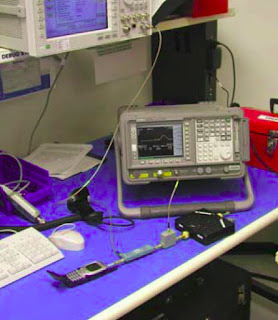Having spent a considerable amount of time looking into this issue, I was surprised I'd never heard that, so I asked Kathy Barnstorff a media relations specialist at NASA if she could tell me more. Well, it turns out that while NASA has produced three reports, none make that conclusion. If anything they say the opposite.
In the most recent from 2004, Truong Nguyen at Langley Research Center tested a particular model Samsung phone that had caused some trouble with the GPS on a single engine airplane the year prior. He found "the threat of interference is real." Dr. Nguyen goes on to suggest that laptop computers and PDAs may also provide similar risk of interference.
(Alert readers may notice that Dr. Nguyen is not alone in this finding. Read what others have to say in the story I wrote for The New York Times.)
Dr. Nguyen and his fellow researchers, A.J. Oria and Scott Pace, have prepared a report rich in mathematical calculations, multi-syllabic electrical terms and graphs. But the conclusion is pretty straightforward.
"Additional work" is needed they write, because wireless devices on airplanes and specifically a combination of devices, "may generate undesired signal in the sensitive aircraft bands."
Dr. Nguyen focused on GPS navigation systems only. An International Air Transport Association study cited in my previous blog posts on this subject suggest pilots are reporting electronic interference on all aircraft systems including flight controls and communication.
Meanwhile, back to the DePaul Tablets study, the principal author, Joseph Schwieterman explained in a phone call over the weekend, that his goal was not to take a position on whether electronic devices are a safety hazard on airliners, only to report that people are using technology on airplanes - as many as 90% are using devices at some point during their flight - and that restrictions on their use below 10,000 feet has consequences.
"Technology is often crucial for dealing with family and work-related emergencies, keeping businesses functioning smoothly, and lessening the stress of being away from home," the report says. On Wednesday his report was revised to remove the erroneous NASA reference.
Based on the documents Ms. Barnstorff sent, the last word from NASA was written nine years ago, a lifetime in terms of technology development. But no matter what you read by others on this charged issue, there is no scientific study by the space agency dismissing concerns about the use of electronic devices on airplanes. That theory seems to be coming entirely from device users.
Make of that what you will.




1 comment:
This is a confidential reporting site run by NASA :http://asrs.arc.nasa.gov/search/reportsets.html
Look at the section entitled 'Passenger Electronic Devices' and be worried. If you are a nervous flyer, don't read the other sections at all.
Post a Comment